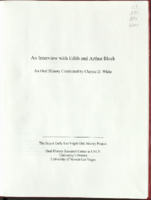Search the Special Collections and Archives Portal
Search Results
Keith Boman Papers on the Smith Center for the Performing Arts
Identifier
Abstract
The Keith Boman Papers on the Smith Center for the Performing Arts consist of materials documenting the construction of the Smith Center for the Performing Arts in Las Vegas, Nevada from approximately 2009 to 2010. The collection includes documents from the construction oversight committee, financial budgets, and board of directors meeting agendas.
Archival Collection
Frank Scott Papers
Identifier
Abstract
The Frank Scott Papers date from 1940 to 1984 and contain promotional materials, photographs, and menus from the Union Plaza Hotel; University of Nevada, Las Vegas (UNLV) basketball memorabilia; and KRLR TV documentation, correspondence, and news clippings. The collection also contains a scrapbook and photographs of the re-opening of the Mizpah Hotel in Tonopah, Nevada.
Archival Collection
Leon Rockwell Papers
Identifier
Abstract
The Leon Rockwell Papers (1829-1986), consist of materials that document Leon Rockwell's life in Las Vegas, Nevada from 1906 until his death in 1968. Included are diaries, correspondence, photographs, postcards, Las Vegas community event programs, ledger sheets, business cards, and scrapbooks. There are a number of books, information on organizations and businesses that Rockwell owned, real estate documents, and early records of the Las Vegas Volunteer Fire Department, of which Rockwell was an original member.
Archival Collection
Jess Mack Papers
Identifier
Abstract
The Jess Mack Papers document the professional life of burlesque agent and comedy writer Jess Mack from 1916 to 1988 in Las Vegas, Nevada. In addition to contracts, correspondence, engagements, and newspaper articles, the collection contains five boxes of jokes, scripts and scenes used in various burlesque productions. Other material includes photographs of entertainers and burlesque stars, joke booklets, and issues of Mack's magazine, Cavalcade of Burlesque, dating from 1951 to 1954.
Archival Collection

Letter from Walter R. Bracken (Las Vegas) to Fred Knickerbocker (Los Angeles), October 14, 1924
Date
Archival Collection
Description
The temporary expedients they used to bring the new well into production, like the makeshift settling pond, needed to be permanently settled before the state and county health authorities got involved. The office of Mr. Osborne and Engineer McKee is mentioned.
Text
Audio recording clip from the fourth interview with Senator Joe Neal by Claytee D. White, March 24, 2006
Date
Archival Collection
Description
Part of the fourth interview with Senator Joe Neal conducted by Claytee D. White on March 24, 2006. Five interviews cover Neal's life from his birth in Mounds, Louisiana, in 1935 to his service as a local politician and community leader. Shortly after joining his family in Las Vegas, Neal served in the United States Air Force from 1954 to 1958. Following his military service, he earned a bachelor's degree in political science at Southern University in Baton Rouge, Louisiana. Neal continued his education at the Institute of Applied Science in Chicago, Illinois, with postgraduate work in law. From 1973 to 2001, he served in the Nevada Legislature as the Senator from Clark County Senatorial District No. 4. In the clip, Neal comments on his experience in Nevada politics.
Sound

Transcript of interview with Edith and Arthur Bock by Claytee White, September 15, 2009
Date
Archival Collection
Description
Text

Transcript of interview with Roger Bryan by Paul Murphy, February 27, 1979
Date
Archival Collection
Description
Text

Transcript of interview with Lois Esther Tarkanian by Claytee D. White, September 24, 2014
Date
Archival Collection
Description
Jerry Tarkanian, legendary and formidable basketball coach, met his match the day he was called before student court at Fresno State College and had to face as one of his judges Lois Esther Huter. Lois, a no-nonsense military daughter, eventually agreed to date Tarkanian and to marry him. The City of Las Vegas got lucky when UNLV recruited Lois’s husband as basketball coach. After picking cotton in California’s Central Valley Lois earned her Master’s degree in speech pathology and holds national certifications in speech pathology, language, and audiology. In 1969 she opened California’s first private day school for the hearing impaired, Oralingua School for the Hearing Impaired in Whittier. In Las Vegas she taught hearing-impaired children in her home on an individual and pro-bono basis. In this interview Lois recalls her teaching career, debates in deaf education, her 12 years on Clark County School District School Board, and the people and the neighborhoods that make up Las Vegas’s Ward 1, the area she has represented on the Las Vegas City Council continuously since 2005.
Text

Transcript of interview with Linda Rivera by Layne Karafantis, October 2, 2009
Date
Archival Collection
Description
Text
